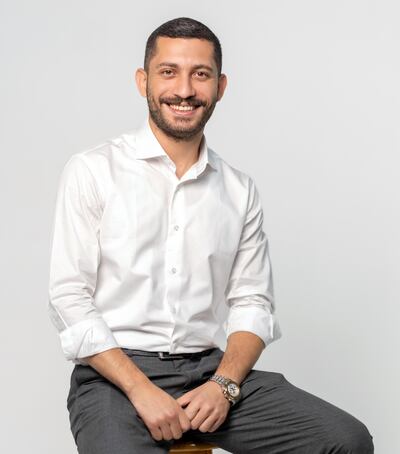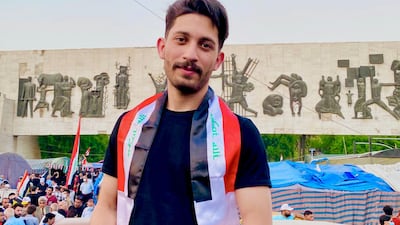In autumn 2019, Zayed Al Assad made a bold, life-changing decision. He was then a petroleum engineering student in Russia, when the streets of Baghdad erupted in mass protests against the ruling political elite, demanding an end to endemic corruption, growing Iranian influence, unemployment and for better public services.
For Mr Al Assad, who took part in many protests between 2014 and 2016 before leaving the country for his studies, it felt like a moment he had been waiting for, a change to reshape Iraq’s future. He immediately left his studies and returned home in October 2019.
“There was a desire for salvation,” Mr Al Assad, 28, told The National. “Iraqis were chanting: ‘We want a homeland’ and ‘we want a state’, a state of institutions,” he recalled, sitting in the sprawling diwan of his tribe in Baghdad, a place where tribesmen receive guests.
“We are talking about young people who were deprived of job opportunities, young people, a large part of whom couldn’t find enough to feed themselves, young people who had reached a point of desperation and hopelessness that drive them to sacrifice their own lives for a better future."
Five years have passed since pro-reform protests broke out in Iraq and Lebanon, and both nations have since sunk deeper into crisis. The movements that once stirred hopes for change have failed to break the grip of entrenched regimes.
Today, Lebanon is caught in a devastating war with Israel, while Iraq faces the looming threat of being drawn in as Iran-aligned militias escalate their involvement in the year-old conflict that exploded after the October 7 Hamas attack on Israel.
Lebanon and Iraq are still mired in corruption and sectarian-based politics protected by the entrenched, Iran-backed political elite. Public services are deteriorating and the youth, who once led the charge for change, are becoming increasingly disillusioned. Lebanon has been plunged deeper into financial crisis, with sharply rising inflation, widespread poverty and political deadlock.
As both countries mark the fifth anniversary of their protests, the path forward remains uncertain as the nations find themselves still grappling with the same issues. Many protesters feel that opportunities for real change have slipped away.
activist
Both uprisings shared common goals and were met with a similar brutal crackdown by security forces and Iran-backed militias. The arrival of Covid further diminished momentum.
In Iraq, one telling factor was the crackdown on protests ion October 2019, demanding job opportunities and contending the removal of Lt Gen Abdul-Wahab Al Saedi, a popular commander of Iraq’s Counter Terrorism Service Staff. It later expanded to other demands. A heavy-handed response was carried out by security forces who fired live ammunition at demonstrators, imposed a curfew, limited internet access and forced them to disperse.
However, the young men and women, like Mr Al Assad, continued to co-ordinate on social media, reorganised and reignited the protests on October 25.
“After October 25, there was a kind of organisation with the setting up of tents and the presence of activists who became known among the protesters,” he said. “Then it turned into a sort of political engagement with the protest movement.

For months, they were met with bullets, water cannon and tear gas, and harassed by militias, plunging the country into renewed instability at a time it was emerging from a bloody war against the terrorist group ISIS.
The response to the unrest has triggered confrontations with protesters across the country and has claimed the lives of more than 600 people, while thousands others were injured.
Like many others, Mr Al Assad believed that real change was within reach, particularly after forcing the government of then-prime minister Adel Abdul Mahdi to resign, but the response from security forces and militias was swift and brutal amid the spread of Covid.
“The protest movement reached the highest of its potential and couldn’t develop further,” he said. “We reached the point where we lost the opportunity."
Five years on, little has changed in Iraq, he said. Iran-backed militias have gained more influence, public services are still shabby and the nation is still struggling with corruption, with scandals of the elite plundering billions of dollars, Mr Al Assad added, actions that led to him boycotting the 2022 elections.
But for others, the October 2019 protests opened the door to politics, such as MP Sajad Salim who won a seat in 2022 national election as an independent candidate. He entered the Iraqi Parliament to “develop a political project and have our voice heard”, he told The National.
Mr Salim concedes that working from within the parliament has been an uphill battle. He claims he has been harassed by militias who stormed his office and filed lawsuits against him in courts. The lawsuit claims he defamed powerful Shiite group, the Popular Mobilisation Forces (PMF), by accusing its leaders of committing crimes.
Despite the setbacks, Mr Al Assad believes in the possibility of change. After leaving petroleum engineering studies he is now studying political sciences in Baghdad and working on establishing an opposition group comprising activists and politicians.
“I’m certain the ongoing despair and the absence of hope for people to live a dignified life in this country will eventually lead to another revolution,” he said. “At some point, things will explode and spiral out of control, and at some point this volcano will no longer be able to contain its lava.”


